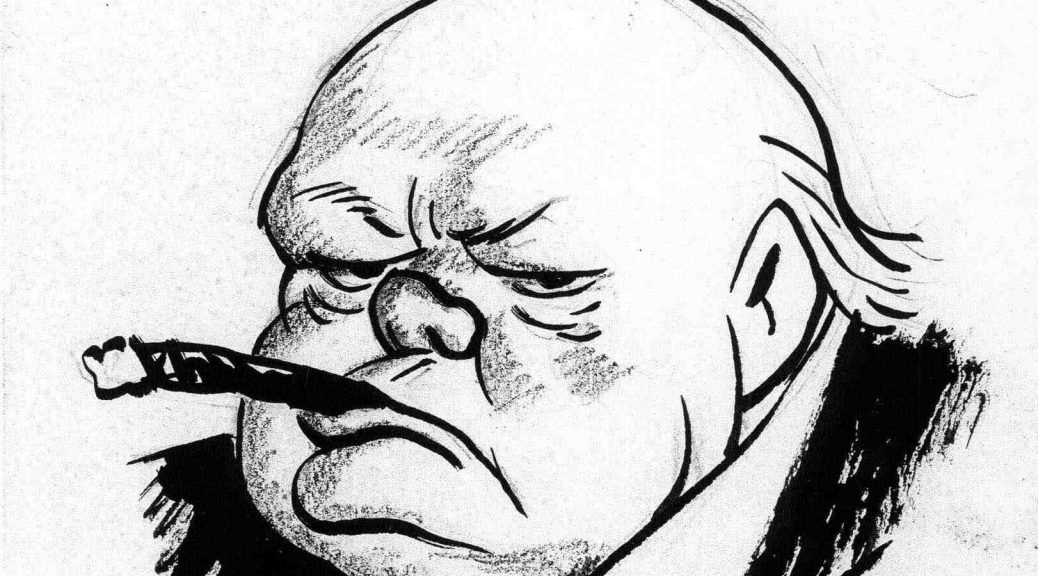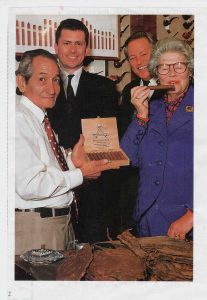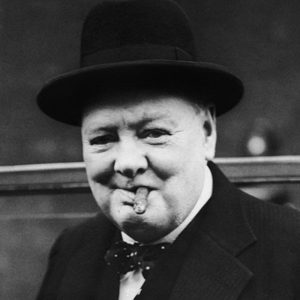
Would Winston Churchill Legalize Smoking Pot?
The first commandment of Lady Soames, Winston Churchill’s renowned daughter (1922-2014), was: “Thou shalt not proclaim what my father would do in modern situations.” However, since she enjoyed smoking a good cigar on occasion, she might excuse the suggestion that if he were around, he would probably not object to legalizing marijuana.

Churchill on Smoking
The journalist and broadcaster Collin Brooks wrote a sprightly essay, “Churchill the Conversationalist,” in Charles Eade‘s collection of articles, Churchill by His Contemporaries. (This 1953 book is inexpensive and well worth owning. It’s an evergreen collection of perceptive pieces on aspects of Churchill’s life and character.)
Churchill’s defense of smoking is classic, Brooks wrote. And, like much of his conversation, this too has passed from the spoken to the printed word. “Some people say that I have smoked too much,” Churchill once exclaimed. “I don’t know. If I had not smoked so much, I might have been bad-tempered at the wrong time.”
“A Second Choice”
 That’s cute, but not as good as Churchill’s remarks in his 1931 article, “A Second Choice.” This was reprinted as the first essay in his book Thoughts and Adventures. Here Churchill considers whether he would make the same choices were he able to live his life again:
That’s cute, but not as good as Churchill’s remarks in his 1931 article, “A Second Choice.” This was reprinted as the first essay in his book Thoughts and Adventures. Here Churchill considers whether he would make the same choices were he able to live his life again:
I remember my father in his most sparkling mood, his eye gleaming through the haze of his cigarette, saying, “Why begin? If you want to have an eye that is true, and a hand that does not quiver, if you want never to ask yourself a question as you ride at a fence, don’t smoke.”
But consider! How can I tell that the soothing influence of tobacco upon my nervous system may not have enabled me to comport myself with calm and with courtesy in some awkward personal encounter or negotiation, or carried me serenely through some critical hours of anxious waiting? How can I tell that my temper would have been as sweet or my companionship as agreeable if I had abjured from my youth the goddess Nicotine? Now that I think of it, if I had not turned back to get that matchbox which I left behind in my dug-out in Flanders, might I not just have walked into the shell which pitched so harmlessly a hundred yards ahead? [Stationed in the trenches in 1916, where he had several miraculous escapes, just managing to be missed by German shells, one of which demolished said dug-out moments after he’d left.]
Libertarian Preferences
Churchill was a libertarian on personal preferences. He abjured vegetarians, teetotalers, dieters and non-smokers, but didn’t attempt to interfere with them. In Dundee, Edwin Scrymgeour, a Scottish prohibitionist, teetotaler and non-smoker, ran against Churchill six times. He finally beat him in 1922. Churchill is alleged to have said, though I can’t confirm it, that Scrymgeour had “all the virtues I dislike and none of the vices I admire.”
In certain respects Churchill quite admired the socialist Stafford Cripps, a member of his wartime coalition. But he didn’t approve of Cripps’s diet: “…there is a man who habitually takes his meal off a handful of peas, and, when he gets a handful of beans, counts that his Christmas feast.”
To his Minister of Food Lord Woolton in July 1940, concerned about too severely imposing wartime rationing, Churchill wrote:
Almost all the food faddists I have ever known, nut-eaters and the like, have died young after a long period of senile decay.…The way to lose the war is to try to force the British public into a diet of milk, oatmeal, potatoes, etc., washed down on gala occasions with a little lime-juice.
So would Churchill legalize the growing and smoking of pot? Of course we have no idea. But on the whole, given what we know about his attitudes toward life, it’s more likely than not.






